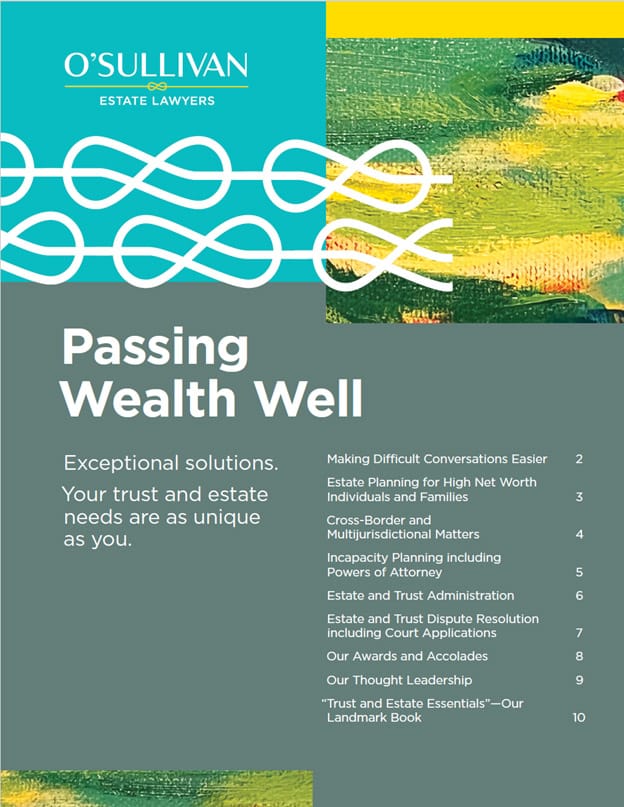Home | Blog
Blog

Celebrating
our 10th year
blog anniversary
Home | Blog
Blog
Toronto Ontario Estate Law Blog
Making Controversial Gifts and Personal Autonomy: The Right to Decide
What does the law say about your autonomy to make gifts, whether during your lifetime or on death under your will? When will the law intervene, and when will it step aside? This issue is of increasing importance in our aging society where many of us will live well into
The Pros and Cons: Online Wills vs Individualized Estate Planning
Wills can take many forms, for example, Cecil George Harris’s historic will, etched onto a panel of farm machinery under which he was trapped and later succumbed to injury, or the Court of Appeal for Ontario’s 2022 finding that a suicide note was a valid will. While the technical legal
How Do Changes to the Alternative Minimum Tax Rules Affect High-Net Worth Taxpayers
Just when high-net-worth taxpayers thought that the amount of tax they must pay could not get any higher, the Canadian government brought in new changes to the Alternative Minimum Tax (the “AMT”) regime. Putting aside politics and the arguments for or against the changes to the AMT regime, this blog
When Can an Attorney for Property Make Gifts on Behalf of a Grantor?
In Ontario, as in other jurisdictions, powers of attorney for property are crucial tools for individuals who may become incapable of managing their property and financial affairs. A power of attorney for property grants the power for one or more people (the “attorney(s)”) to act on behalf of the person
Trust Reporting and the Duty to Account: “I Fought the Law and the Law Won”
All Trustees, whether Estate Trustees or otherwise, have a duty to account to the beneficiaries on whose behalf a trust is being managed. That is to say, those vested with the power to manage property on behalf of others are obligated to provide to the beneficiaries an accounting of their
What Can We Expect for U.S. Estate Tax Under a Second Trump Administration?
Now that Donald Trump has been inaugurated, what can we expect to happen to U.S. estate tax? There has been a rapid flurry of executive orders and announcements since the January 20, 2025 inauguration, but not yet any guidance on what to expect for U.S. estate tax in 2025 and
Shifting Sands: Generational Values and Attitudes Toward Wealth
Generations are shaped by the events, technologies, and cultural shifts of their time. As we usher in the new year, we also welcome the start of a new generational cohort, Generation Beta or Gen Beta—those born between 2025 and 2039. They follow Gen Alpha, who were born between 2010 and
“I Want to Give My Estate to My Dog” – Dispelling Common Estate Planning Myths
Given the absolute importance of ensuring our clients’ final wishes will be properly carried out, and their loved ones properly cared for, estate planning lawyers approach their work with an almost unparalleled level of seriousness and gravity, often leaving very little room for humor to intrude. That is not to
Update: Tax Compliance for Executors and Trustees, plus Key Deadlines
I previously blogged about executors’ tax compliance responsibilities. In the past two plus years since that blog, there have been a number of changes of which executors and trustees should be aware. This blog provides an overview of key tax compliance responsibilities of executors and trustees and highlights some of
Open the Pod Bay Doors: The Future of AI and Probate Applications
While modern artificial intelligence (“AI”) has already proved an immensely useful tool, with IBM’s Watson serving as an early example of a natural language processor able to receive and respond to plain language inquiries in plain language with a high degree of accuracy, it has also proven to have its

Download our “Passing Wealth Well” e-brochure
Learn more about:
- Estate planning for High Net Worth
- Cross-border and multijurisdictional matters
- Incapacity planning
- Representative mandates from clients
- And more…